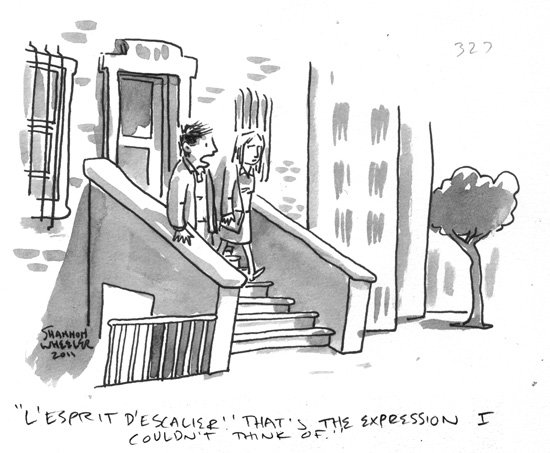
In 18th century French architecture, the reception area and meeting rooms in hotels, mansions, commercial, and governmental buildings were on the second floor, accessible by a grand staircase. Important conversations, negotiations, and treaties were held on the second floor. After leaving a meeting, one would walk down the stairs to exit the building.
Denis Diderot, a French philosopher from the 18th century, coined a phrase—L’esprit de l’escalier—that describes a feeling we’ve all had. Esprit means mind, thoughts, spirit. Escalier means stairs. The phrase describes the feeling of having left a conversation or negotiation and suddenly realizing that you did not respond or negotiate well. You wish you could return to the conversation or meeting but you cannot; you’re at the bottom of the stairs and you can’t turn back. It is a blend of regret, doubt, second thoughts, and wanting to relive the moment.
-
-
- You’ve accepted a new job, but later realize that you could have negotiated a better package.
- You had a confrontation with an intimidating person during which you couldn’t think of the right thing to say, but now you know what you should have said.
- You have now thought of the perfect comeback for an argument you had, but it’s too late.
- An important issue was discussed at work. The next day you realize that you were not prepared for the discussion and so neglected to offer your thoughts.
-
I’ve had the feeling often. Years ago I walked into a jewelry store to sell my Rolex. The owner asked me, “How much do you want for the watch?” I gave him a price. He smiled and said, “Okay.” I had that sinking feeling that I had asked too little.
Lessons to learn:
-
- Don’t make hasty decisions, particularly when you’re flustered, caught off guard, or unsure of the best choice. There’s nothing wrong with saying, “I need more time to think about this.” Mature thoughts are usually better than impetuous ones.
- When negotiating, don’t speak first. Instead, insist that the other party start.
- Negotiate every agreement.
- Before a conversation or negotiation is finalized, imagine walking down an imaginary staircase realizing you no longer have the opportunity to speak. Would you be satisfied?
Remembering the “spirit of the staircase” will help us be more careful and will lead to better decisions.

Great advice! I don’t have enough fingers or toes to count the number of times I’ve had that feeling. I’ve written and negotiatied hundreds of contracts and specifications – and always thought back about “is there anything that I missed”. But it is a really good feeling when it all works out. Not so much when I did miss something.
Musically, after a rehearsal, there is always something that I wish I could have achieved or could have done a better job of leading. I like all these things because it leads to a better nest time.
Thanks, Ed, for adding to the conversation. We’re all inclined to re-think and even question decisions we’ve made. That encourages us to be more thoughtful and slow to make decisions. I look forward to our trip together next month. Don
Oh so true! In English employment law, we often introduce meetings by saying I will not be making a decision today. It gives time to go and reflect on the matters raised in the meeting.
Perhaps we could each ask if it is possible to delay our decision until we have had time to consider all options? The meeting may only allow you to consider the options offered by the other party rather than all the possible options. You could have left the jewellery store and asked other dealers for a price before selling your Rolex to the first dealer you approached. If the US market is like the UK one, dealers make huge profits on second hand items and often only want to do a deal if you are part exchanging one watch for a more expensive one and rarely want to part with cash.
The old adage about marriage “Marry in haste, repent at leisure.” could be said to be true of any contract.
I like the staircase analogy. I need to remember it!
Best wishes
Angela Willson
Thanks, Angela, for taking the time to share your thoughts. I like that phrase “I’m not going to make a decision today.” That affirms everyone’s input, that it is valued and will be part of the equation. Take care, Don.